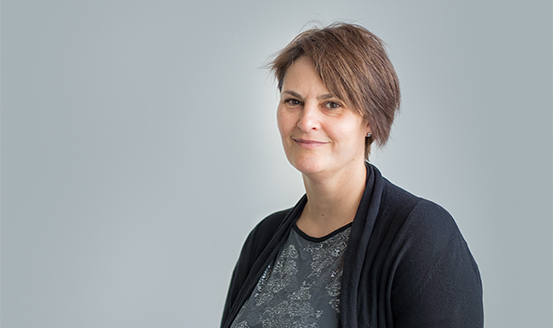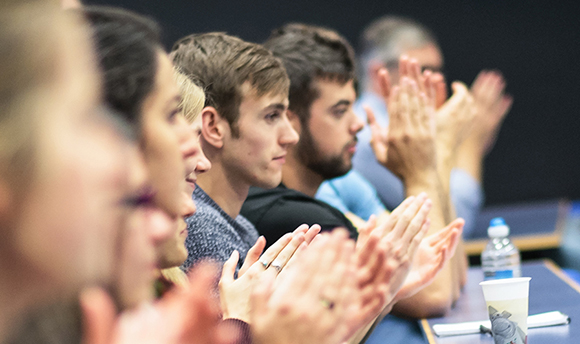Undergraduate Open Days (September and October 2024) Book your place at a QMU Open Day
Psychology and Sociology - BSc (Hons)
Are you fascinated by human nature, by who we are, how we interact and why we behave the way we do? Are you curious about the forces shaping society around us and how we can change it for the better? If so, you will enjoy our BSc (Hons) in Psychology and Sociology. Our joint degree provides an intellectually challenging and stimulating environment for exploring questions around the individual and society.
The combination of studying psychology and sociology will allow you to explore a large and fascinating world, the fundamental nature of human beings and how that nature, alongside cultures, institutions and structure, shape our social world.
A degree in Psychology and Sociology opens up a wide range of career opportunities, having equipped you with highly sought-after knowledge and skills that are transferable to many fields.
Why QMU?
- Innovative and unique course: Through the unique integration of sociology and psychology teaching in ‘hybrid’ modules, we have developed a highly innovative and unique joint degree.
- Stimulating learning environment: We offer a stimulating environment in which students can develop the intellectual and professional edge needed for working with 21st century society.
- Staff expertise: Our staff work on outward-facing, innovative and cross-disciplinary research.
- Support for students: Our class sizes are small compared with some universities, so you have closer and more personal support and guidance from our staff.
Psychology and Sociology - BSc (Hons): The course in brief
This course is designed to equip you with a comprehensive understanding of psychological and sociological perspectives in both theory and practice. Combining psychology’s focus on the individual with sociology’s focus on the social, the course provides you with valuable interdisciplinary insight into topics, issues and debates surrounding human behaviour and society. Our interdisciplinary approach encourages you to connect the dots between psychological phenomena and sociological patterns, fostering a holistic understanding of the human experience.
You will also engage with debates about the practical, theoretical and ethical issues in relation to conducting research and analysing data from the perspective of both disciplines, as well as explore how research can be used to better understand and find solutions to address social issues relevant to different communities and social groups.
Throughout the course, you will develop a range of transferable skills that employers are looking for, including critical analysis, communication skills and research skills. Our graduates have gone into a wide variety of fields, including business, health, media, education, social care and management.
On this course you will:
- reflect upon the ways in which psychological and sociological knowledge can affect real change in people’s everyday lives;
- learn to use social scientific methods and evidence to make sense of human behaviour;
- learn how to think and write critically, giving you skills that can be valuable in many professional fields; and
- have opportunities to go into communities and apply your skills and knowledge in a real-world context.
How will I be taught?
Structure
All students enrol onto the honours degree, but you can choose to exit with an ordinary degree after three years.
Teaching, learning and assessment
You will be taught in lectures, seminars, practical workshops and laboratories. Outside these timetabled sessions you will be expected to continue learning through self-study. Your work will be assessed using a number of techniques, including essay writing, presentations, podcasts, report writing, critical reflections and examinations.
Exchange opportunities
Studying abroad through our exchange programme can be one of the most exciting and rewarding challenges for a student to experience. The opportunity to travel and live in another country, learn different customs and traditions, meet new people and future career draws many students into the exchange programme. In Year Three you have the opportunity (subject to availability) to study for one semester at a university overseas. Please visit the Exchanges and Study Abroad pages for more information.
Teaching staff, class sizes and timetables
You can read more about the teaching staff on this course at the bottom of this page. Please note that teaching staff is subject to change.
For more information, please also visit ‘How we teach and how you’ll learn’.
What will I learn each year?
Year One
You will:
- start to gain a thorough grounding in the key concepts, theories and schools of thought in psychology and sociology;
- develop a sound understanding of the historical development and contemporary applications of psychological and sociological knowledge as well as explore the very latest debates in both disciplines; and
- focus on enhancing a wide range of essential transferable skills, paying particular attention to improving your interpersonal and presentation skills, effective reading and writing, analytical thinking and critical reflection, as well as your research skills.
Modules
- Introduction to Academia
- The Sociological Imagination 1 – Classic & Contemporary Sociological Theories & Concepts
- The Sociological Imagination 2 – Diversity and Inequality
- Introduction to Psychology 1
- Introduction to Psychology 2
- Foundations of Psychology: Core Concepts and Practices
Year Two
You will:
- continue to develop a thorough grounding in the key concepts, theories and schools of thought in psychology and sociology;
- refine your ability to make informed, comparative, critical judgements and evaluations of competing psychological and sociological approaches to substantive issues;
- start to develop competence in the critique of published psychological and sociological research in relation to conceptual and methodological considerations; and
- start to develop research skills in psychology and sociology
Modules
- Current Debates in Sociology
- Material Culture: The Social Life of Things
- Exploring Research
- Self & Identity
- Developmental and Social Psychology
- Psychology Option module (either Individual Differences, Wellbeing and Ethical Practice or Biological and Cognitive Psychology)
Year Three
You will:
- continue to develop your ability to critically evaluate the utility of a range of epistemological and methodological perspectives in interrogating psychological and sociological issues;
- refine your skills to employ evidence-based, comparative reasoning and to critically examine practical, theoretical and ethical issues associated with the use of different methodologies, paradigms and methods of analysis in psychological and sociological research;
- enhance your understanding of ethical issues and current codes of ethics and conduct;
- develop competence in the presentation and interpretation of qualitative and quantitative data; and
- have the opportunity (subject to availability) to study for one semester at a university overseas. For more information, visit Exchanges and Study Abroad.
Modules
- Interaction & Social Order
- Sociology of Knowledge & Science
- Sociological and Psychological Approaches to Social Movements
- Research Skills
- Developmental Psychology
- Psychology Option Module (either Cognitive Psychology or Psychobiology in Context)
Year Four
You will:
- develop specialisms in psychology and sociology and be able to demonstrate detailed and contemporary knowledge and understanding in relation to chosen specialisms;
- through independent scholarly activity, synthesise and critically evaluate a wide range of psychological and sociological theories, theorists, concepts and practices;
- work closely with a member of academic staff to conduct your own independent research project appropriate to sociology and/or psychology; and
- become an independent, pragmatic, reflective and critical thinker.
Modules
- Dissertation (in Psychology, Sociology or both)
- Two Sociology option modules
- Two psychology option modules
Option modules
Sociology options may include:
- Understanding the Sociological Present
- Class, Poverty and Inequality: Social Policy Response
- Sociology of Scotland
- Inequality, Poverty and Social Policy in Comparative Perspective
- Queer Feminist Sociology in Action
Psychology options may include:
- Cognitive Science of Belief
- Community Engagement
- Critical Engagement with the History of Psychology
- Peer Relations in Childhood and Adolescence
- Memory: Origins and Structures
- Evolutionary Psychology in the Modern World
These modules are indicative and may be subject to change year on year.
NB The modules listed here are correct at time of posting (Feb 2024) but may differ slightly to those offered in 2025. Please check back here for any updates.
Careers
A degree in Psychology and Sociology opens up a wide range of career opportunities, having equipped you with highly sought-after knowledge and skills that are transferable to many fields. Examples of transferable skills you will develop throughout your degree include: critical thinking and analysis, communication skills, problem-solving skills, research skills, data analysis and interpretation skills, teamwork and collaboration.
Our alumni are pursuing careers in social and community work, consumer and social research, public policy development, journalism, teaching, academia, marketing, media and human resource management. These are just a few examples, and the versatility of a joint degree in Psychology and Sociology allows graduates to adapt their skills to various fields and industries, making them well-prepared for the evolving demands of the workforce.
Psychology and Sociology - BSc (Hons): Entry requirements and application information
Entry requirements
Scottish Higher: Standard – BBBB, Minimum – BCCC
A Level: BCC
Irish Leaving Certificate: H2 H2 H3 H3
International Baccalaureate: 28 points
International: IELTS of 6.0 with no element lower than 5.5
Required subjects: English required and Maths preferred at Nat 5/ GCSE at grade C/4 or above
Am I a Widening Access student?: We apply the minimum entry criteria to applicants who meet one or more contextual factor. To see if this would apply to you, please refer to the access and application page.
Mature/Access: We welcome applications from mature students with relevant qualifications and/or experience. Visit our College Leavers and Mature Students Advice page for more information.
Direct Entry:
Year Two
- HNC in a related subject with B in the graded unit
- Scottish Higher: BC at Advanced Higher in relevant subjects plus BB at Higher
- A Level: BBB in relevant subjects
Year Three
- HND in a related subject with CB in the graded units
For details of related HNC and HND courses, visit our College Leavers and Mature Students Advice page.
Other requirements
A satisfactory criminal records check from the Protection of Vulnerable Groups (PVG) Scheme may be required if you chose to engage in work experience/community engagement opportunities.
Other costs
- The cost of the PVG check is the responsibility of the student. For more information on this, visit the UG 2025 fees page on our website.
Disability/health conditions
If you have a disability, long-term physical or mental health condition, or learning disability, it should not stand in the way of your studying at QMU. However, if you are not sure whether your disability might be a barrier in your studies or in relation to the professional standards, please contact the disability service who will be able to have a conversation with you about reasonable adjustments and supports available to you.
Terms and Conditions
- The delivery of this course is subject to the terms and conditions set out in our 2025/26 Entry Terms and Conditions (Undergraduate).
- The course information on this page is correct at the time of posting (Feb 2024) but may differ slightly for 2025 entry. Please check back here for updates.
Associate student places
You can study this course as an associate student, completing the first year at Newbattle Abbey College or West Lothian College.
Read more about the Associate Student Scheme.
Awarding body
QMU
Become your best you: study at QMU
Course Overview
Opportunities to meet us: open days and more
As well as open days, we offer campus tours and online events throughout the year to help you find out more about student life and studying at QMU.
Open days and other ways of meeting us: more information








